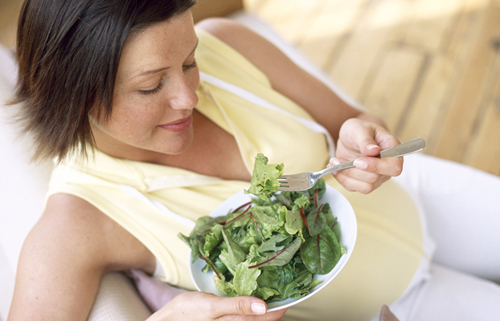You can optimize your own health and your baby’s future health by eating a nutritious, balanced diet throughout pregnancy.
Eating regular nutritious meals and snacks
throughout the day is vital during pregnancy to keep your energy levels
up, and to provide your growing baby with all he needs to develop well.

In recent years, much
has been learned about what constitutes a healthy diet in pregnancy. In
addition to the importance of nutrients such as folic acid,
there is mounting evidence that a person’s health may be influenced by
the mother’s diet in pregnancy, including whether particular nutrients
were received at certain times. Current thinking is that good nutrition
in pregnancy may reduce a baby’s future risk of diseases such as
obesity, diabetes, and heart disease.
In addition to
influencing your baby’s health, good nutrition in pregnancy also
optimizes your health, helping you to deal with the demands of
pregnancy.
A healthy diet
Getting the right balance
of protein, carbohydrates, and fats in pregnancy is simple, since the
ratios are the same in pregnancy as at other times: 45–65 percent of
your calories should come from carbohydrates; 20–35 percent from fats;
and 10–35 percent from protein. The components of these nutrients don’t
need to be in this exact ratio for each meal, or even every day, but you
should aim to achieve this balance over the course of a week. A diet
that includes plenty of vegetables, fruits, whole grains, and good
proteins and fats will automatically contain the proper mix of
nutrients.
Carbohydrates
Carbohydrates are
an important source of fuel for you and for your baby since they are
broken down into glucose, which passes easily across the placenta. Try
to get six servings a day, a serving being equivalent to a slice of
bread, 2 oz (60 g) of cereal, or five crackers.
Carbohydrates are
divided into two subgroups: refined and unrefined. In general, white is
bad when it comes to carbohydrates, since refined foods such as white
rice and white breads are rapidly broken down and enter the bloodstream
in the form of a spike of glucose. It is thought that this spike may
have health risks for mother and baby, producing larger babies with a
subsequent risk of obesity later in life.
Unrefined carbohydrates
are less processed, so they break down more slowly in the bloodstream
and release glucose steadily. They are also a good source of fiber,
which helps prevent constipation. These are a healthier choice, and at
least half, if not all, of your carbohydrates should come from unrefined
(whole grain) sources. such as whole-wheat or multigrain bread; brown
rice, whole-wheat pasta, and cereals.
Protein
Protein is essential for
the growth of the baby and the placenta, as well as for your health.
Pregnant women need around 6-61/2 oz each day. Aim for two to three
servings of protein-rich foods a day, a typical serving being 3 oz (85
g) red meat, or 5 oz (150 g) fish. Since most adults get about 31/2 oz
(100 g) of protein daily, there is usually no need to increase your
intake, especially if you have protein at each meal. If you’re
vegetarian, in addition to protein at each meal, you should have a
protein-containing snack. If you’re having twins or more, ask your
doctor how much protein to consume and when breast-feeding, 61/2 oz (185
g) daily.
Choose protein sources
that contain less saturated fat, such as skinless chicken, lean beef
and pork, tofu, low-fat cheese and yogurt, and skim milk. Fish, nuts,
and seeds contain healthier unsaturated fatsalthough your intake of some fish should be limited since they contain mercury, which could be harmful to your baby (see Dietary precautions).
Fats
Fats contain vitamins
and contribute to the healthy development of cells. However, although
fats make a useful contribution to overall nutrition, their intake needs
to be limited. Choose healthier unsaturated fats, found in foods such
as fish and some types of oil, over unhealthy saturated fats found in
whole milk dairy products, meat, or trans fats found in processed foods.
Omega 3 fatty acids
Studies suggest
that the development of the baby’s nervous system may be boosted by
omega 3 fatty acids, the richest source of which is found in fatty fish.
Avoid fish that are high in mercury (see Dietary precautions)
and opt instead for salmon and anchovies, which are good, safe sources
of omega 3 fatty acids. Wild salmon is very rich in omega 3, but
farm-raised salmon is also a good source. Other sources include omega
3-enriched eggs, flaxseed, flaxseed oil, walnuts, canola oil, and omega 3
supplements and prenatal vitamins containing omega 3 fatty acids.
Dairy products
These are an important
component of the diet since they provide a good supply of proteins and
fats, as well as calcium and some vitamins. Calcium is essential for the
healthy development of bones and teeth. Opt for low-fat dairy products
and low-fat or skim milk. Aim for 2–3 servings each day, a typical
serving being 1 oz (30 g) of hard cheese, or 1 cup (200 ml) milk.
Vitamins and minerals
In pregnancy, you need to
ensure a rich supply of vitamins and minerals, since these are
important for your own health and for your developing baby. They support
the healthy functioning of body systems and contain antioxidants, which
protect the body against the effects of harmful chemicals called free
radicals. Good sources of the most important vitamins and minerals are
given below. As long as you eat a varied diet that includes plenty of
fruits and vegetables, you should be getting all you need, with a couple
of exceptions. It can be hard to get enough iron in your diet to meet
the demands of pregnancy. Your iron levels will be checked during
pregnancy and supplements may be recommended. You’ll also need a folic
acid supplement before conceiving and in early pregnancy (see Folate and folic acid).
Eating plenty of fresh
fruit and vegetables will help optimize your health during pregnancy
because your body will be equipped with all the essential vitamins and
minerals.

Vitamin A
This is important for
healthy eyes, skin, and hair; it’s found in orange fruit and vegetables,
such as apricots, peppers, carrots, and tomatoes.
Vitamin B
This contributes
to the healthy functioning of body systems, and helps the body fight
infection. Good sources include bananas, milk, whole grains, cheese, and
cabbage.
Vitamin C
This aids the
absorption of iron and helps fight infection. Rich sources include
citrus fruits, kiwis, peppers, broccoli, and spinach.
Vitamin D
This helps the
absorption of calcium. Food sources include eggs and dark leafy green
vegetables, and it is also obtained from sunlight. Women with limited
exposure to sunlight, who are housebound, predominantly covered when
outdoors, or from Africa, South Asia, the Middle East, or the Caribbean
should take a 10 mg vitamin D supplement daily.
Vitamin E
This vitamin contains antioxidants and keeps skin, hair, and muscles healthy. Good sources of vitamin E include nuts and seeds.
Folate and folic acid
Studies have
shown that sufficient amounts of the B vitamin folic acid, or its
natural form folate, can help reduce the risk of neural tube defects,
such as spina bifida, by up to 50 percent. In these defects, the
embryonic neural tube fails to close properly during the first four
weeks of pregnancy, leading to incomplete development of the brain and
spinal cord. Folate helps the neural tube close and pregnant women are
advised to eat a folate-rich diet. Foods high in folate include green
leafy vegetables, legumes; and fortified cereals. It may not be possible
to get sufficient folate through diet alone, so women are also advised
to take a folic acid supplement of 400 micrograms before conception and
during the first trimester.
Iron
This is needed for
hemoglobin production in red blood cells. Sources include meat, fish,
chicken, eggs, dried apricots, spinach, and broccoli.
Calcium
This is essential for
healthy bones and teeth. Sources include dairy products, eggs, fortified
cereals, and leafy green vegetables.
Zinc
This helps maintain a healthy immune system. Sources include seafood and nuts.